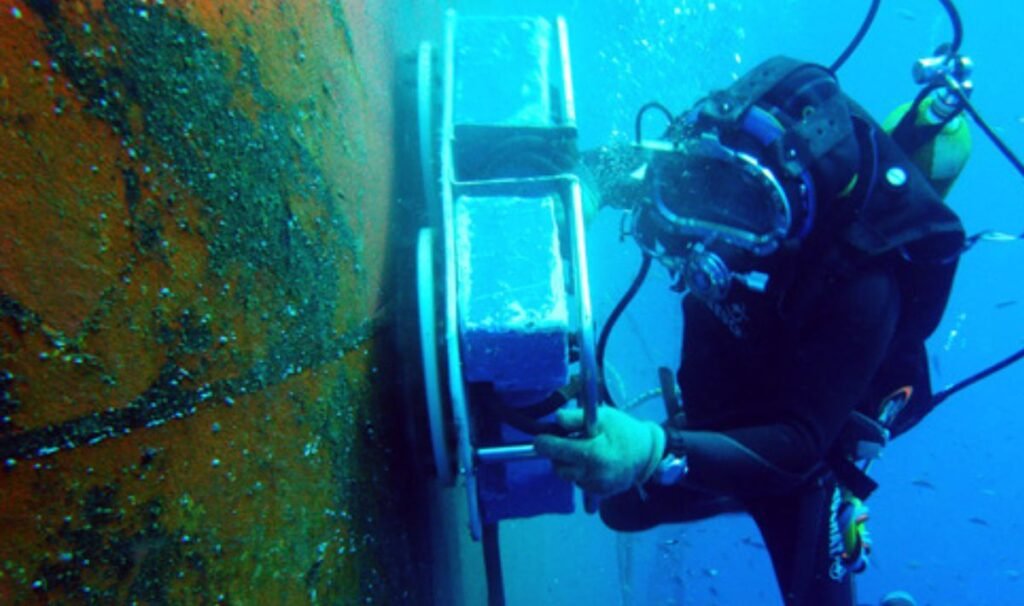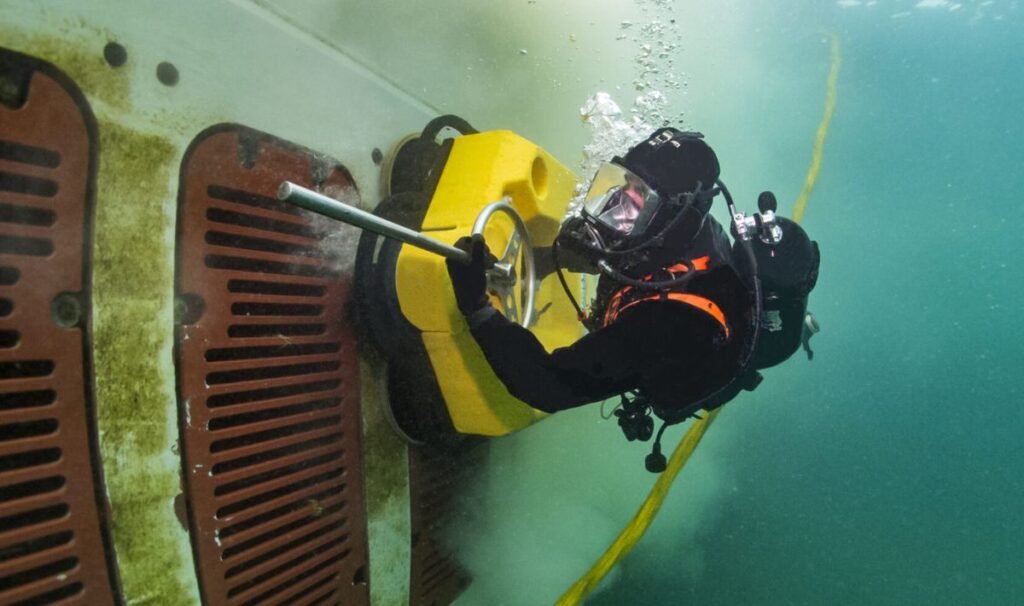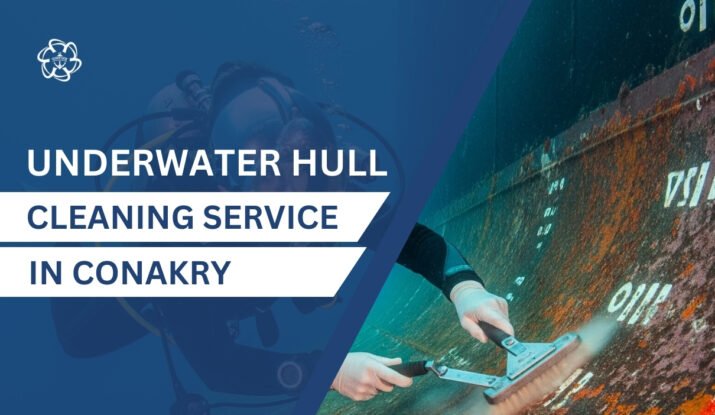Shipping is the lifeblood of Conakry, Guinea’s bustling capital and a key West African port. Vessels calling at Conakry face a persistent challenge: marine growth on their hulls. Over time, barnacles, algae, and other organisms accumulate, increasing drag and reducing efficiency. This is where underwater hull cleaning in Conakry becomes indispensable, ensuring vessels maintain peak performance and comply with international standards.
Why Underwater Hull Cleaning in Conakry is Essential
A fouled hull can increase fuel consumption by up to 10% or more, drive up emissions, and slow down shipping schedules. For shipowners and operators, regular underwater hull cleaning in Conakry is not just about aesthetics—it’s about operational savings, safety, and environmental responsibility. Clean hulls mean lower costs, fewer delays, and compliance with the world’s tightening biofouling regulations.
The Maritime Environment of Conakry

Conakry sits on the Atlantic, where warm, nutrient-rich waters create the perfect conditions for rapid marine growth. Ships that linger in port or operate along the coast are especially prone to biofouling. The need for underwater hull cleaning in Conakry is amplified by the region’s climate and the heavy volume of international shipping traffic.
How Underwater Hull Cleaning in Conakry Works
Underwater hull cleaning in Conakry is a multi-step process that combines diver expertise, advanced technology, and strict environmental controls.
Inspection and Assessment
Before cleaning begins, a thorough inspection is performed. Divers or remotely operated vehicles (ROVs) assess the hull’s condition, identify fouling types, and check for damage or sensitive equipment. This step ensures that the cleaning method is tailored to the vessel’s needs and that anti-fouling coatings are protected.
Cleaning Techniques and Equipment
There are two main approaches to underwater hull cleaning in Conakry:
- Traditional Diver-Based Cleaning: Certified divers use rotating brushes, high-pressure water jets, and hand tools to remove marine growth. Vacuum systems may be employed to capture debris and prevent pollution.
- ROV-Based Cleaning (HullWiper): Remotely operated vehicles use adjustable seawater jets instead of brushes, reducing the risk of coating damage. The ROV collects residues with onboard filters for safe onshore disposal, ensuring no harmful materials are released into the sea.
Both methods are designed to be efficient, safe, and compliant with international standards.
Environmental Protection and Sustainability
Environmental protection is a top priority for underwater hull cleaning in Conakry. Modern cleaning technologies, like those used by HullWiper, prevent the discharge of harmful residues and invasive species into local waters. Collected materials are safely disposed of onshore, supporting Guinea’s commitment to sustainable maritime operations.
Eco-friendly hull cleaning not only protects marine life but also helps shipowners meet the strict requirements of the International Maritime Organization (IMO) and local authorities. This proactive approach reduces the risk of cross-pollination of alien species and supports global efforts to lower carbon emissions from shipping.
Regulatory Compliance in Conakry
The Port of Conakry and Guinean authorities enforce strict regulations on hull cleaning to safeguard marine ecosystems. Service providers must comply with guidelines from the IMO, local port authorities, and environmental agencies. Hull cleaning operations in Conakry are approved by bodies such as the Merchant Shipping, the Guinean Naval Society, the Maritime Prefect, and the Autonomous Port of Conakry.
Providers like HullWiper are compliant with IMCA and IMO guidelines, ensuring all operations are safe, legal, and environmentally responsible.
Benefits of Regular Underwater Hull Cleaning in Conakry

There are compelling reasons to schedule regular underwater hull cleaning in Conakry:
- Fuel savings: Clean hulls reduce drag, saving up to 10% or more in fuel costs.
- Improved vessel performance: Ships maintain optimal speed and maneuverability.
- Lower emissions: Reduced fuel consumption means fewer greenhouse gases.
- Extended coating life: Protects anti-fouling paint and reduces corrosion.
- Regulatory compliance: Avoids fines and delays at the port.
- Early issue detection: Inspections can reveal damage or wear before it becomes critical.
Cost Factors and Value for Shipowners
The cost of underwater hull cleaning in Conakry depends on:
- Vessel size and type
- Extent and type of fouling
- Chosen cleaning method (diver or ROV)
- Frequency of service
- Additional services (propeller polishing, inspections, repairs)
While there is an upfront investment, the savings in fuel, reduced dry-docking, and fewer repairs quickly add up. Many providers offer bundled maintenance packages for regular clients, providing better value over time.
Tips for Shipowners and Operators in Conakry
To maximize the benefits of underwater hull cleaning in Conakry:
- Schedule cleanings regularly—don’t wait for heavy fouling.
- Use quality anti-fouling coatings to slow down marine growth.
- Keep detailed records of all cleanings and inspections.
- Communicate with your cleaning team about sensitive equipment or previous repairs.
- Stay informed about local regulations and environmental requirements.
Conclusion
Underwater hull cleaning in Conakry is more than just a maintenance task—it’s a strategic investment in your vessel’s efficiency, safety, and environmental stewardship. With experienced local teams, cutting-edge technology, and a commitment to best practices, you can keep your ship in top shape, cut costs, and protect West Africa’s vibrant marine environment. Next time your vessel calls at Conakry, remember: a clean hull is your ticket to smoother, safer, and more sustainable voyages.
FAQ:
Q1. How often should I schedule underwater hull cleaning in Conakry?
Every 3 to 6 months is typical, but frequency depends on your vessel’s activity and time in port.
Q2. Can underwater hull cleaning in Conakry damage my ship’s paint?
Professional divers and ROVs use specialized methods to protect anti-fouling coatings.
Q3. Are there environmental restrictions on underwater hull cleaning in Conakry?
Yes, local and international regulations require eco-friendly practices and proper containment.
Q4. Does regular underwater hull cleaning in Conakry save fuel?
Absolutely—a clean hull can reduce fuel use by up to 10% or more.
Q5. What should I look for in a hull cleaning provider in Conakry?
Choose certified divers or ROV operators, modern equipment, transparent pricing, and a strong reputation for safety and compliance.


